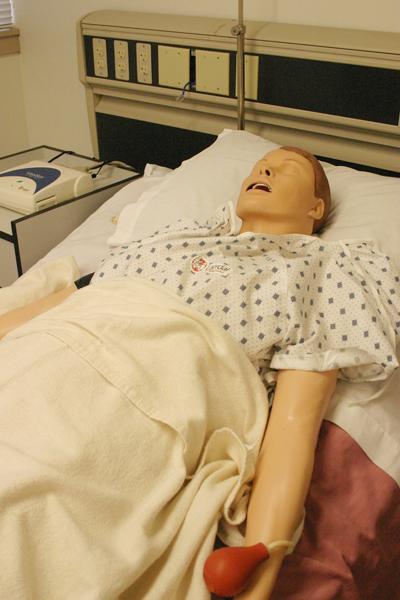CSU may offer doctor of nursing degrees

Sac State wants to make sure nursing equipment in lab classrooms doesn’t go to waste. The CSU system will attempt to shore up against nursing shortages by offering new programs for students interested in the field.:
May 9, 2008
New legislation currently in its early stages could allow the California State University system to offer students a doctor of nursing practice degree in hopes of putting an end to California’s nursing crisis.
“Statewide, the California Board of Registered Nursing reported that in 2005-06, nursing programs turned away 61.3 percent of qualified applicants because there was not sufficient capacity to teach those eligible students,” said Teresa Ruiz, public affairs communications specialist for the CSU Chancellor’s Office. “The goal of this bill is to expand the nursing program capacity by creating more faculty, so we can teach more students and increase the number of new nurses.”
California’s nursing shortage is due to an endless cycle that is caused by a lack of available nursing programs.
Without the programs, there are less qualified faculty members available to train students in nursing; this causes a limited amount of student nurses to graduate, which results in the shortage.
Only the University of California offers nursing doctorate degrees to its students, but under Sen. Jack Scott’s (D-Pasadena) Senate Bill 1288, they could also be accessible through the CSU system.
“In California, only six universities offer doctoral nursing programs, the minimal level to qualify graduates for tenure-track faculty positions,” Ruiz said.
On April 17, the bill was overwhelmingly passed by the Senate Education Committee. It is waiting for a vote in the Senate Appropriations, a fiscal committee that will determine what the costs associated with the bill might be.
The only problem with the bill and installing the programs within the CSU is the funding.
Because the bill would allow doctorates to be awarded through state schools, the initial funding for the programs is going to come through private donations.
Ann Stoltz, department chair for the division of nursing, said this is in large part due to the proposed budget cuts California is experiencing.
“The problem is there is no funding for it,” Stoltz said. “Given the budget times we are having right now, the only way to get it through legislation was by saying it would have to be funded privately in the beginning.”
During a meeting at the CSU Chancellor’s Office with all the department chairs, Stoltz said the possibility of establishing these programs within the CSU system was discussed and overwhelmingly supported by those in attendance.
If the bill passes, the only other issue that would stand in the way of implementing these programs, aside from funding, would be a lack of qualified faculty.
“Not everyone has the faculty to be prepared to offer the program,” Stoltz said. “They all have to have a doctorate in order to teach these programs.”
Only two out of 12 nursing faculty members have their doctorates at Sac State, Stoltz said.
There are several other nursing faculty members who are in the process of working toward a doctorate, something they are doing in addition to teaching at Sac State, Stoltz said.
“We are really working on increasing our qualified faculty,” Stoltz said. “In about three years, if everyone stays, we would conceivably have enough faculty to teach the programs.”
Even if Sac State had the qualified amount of faculty to offer the programs, it would take another year or two of planning to actually implement them on campus.
Given the need for faculty with doctorates and the planning of these programs, Sac State would not be posed to start anything until about five years, Stoltz said.
But SB 1288 has to pass the legislative committees before anything can be implemented into the CSU system.
As of press time, the bill is waiting for the fiscal committee hearing, which will determine the financial impacts the bill could have on the state. The hearing will be held mid-May.
“It’s in the beginning stages, but we are really optimistic,” said Wendy Gordon, spokesperson for Scott. “Senator Scott has worked with the governor before on nursing education programs so this has a good chance of passing.”
Because the bill passed overwhelmingly in the first Senate hearing, Gordon said it shows its popularity and the support that people have for it.
The bill is also supported by the University of California system, which the CSU had to work with in order to get its approval, as it is the only university system in California that offers a nursing doctorate.
“The state recognizes that the CSU is one of the best outlets to offer a doctorate because we graduate about 90,000 students a year into the work force,” said Paul Browning, spokesperson for the CSU.
If passed, SB 1288 could create and expand nursing programs and increase the number of qualified faculty, thus allowing the CSU and California community colleges to operate at a larger capacity.
All nursing programs within the CSU and community colleges are operating at capacity, which is why so many applicants get turned away.
Tiffany Castle, junior pre-nursing major at American River College, said the bill will open opportunities for current nursing students.
“SB 1288 is a good idea, because there is a big demand for nurses,” Castle said. “Because the program is so competitive, a lot of applicants get turned away and this would help solve that problem.”
Castle said the program will help her personally by giving her a better chance to get into the classes and graduate sooner.
More importantly, Castle said it will help others by putting out more nurses and helping California’s economy.
“Nurses are vital because they help care for others during emergency situations,” Castle said. “I think it will also boost California’s economy because more people will have jobs.”
Isela Reyes can be reached at [email protected].




























































































































